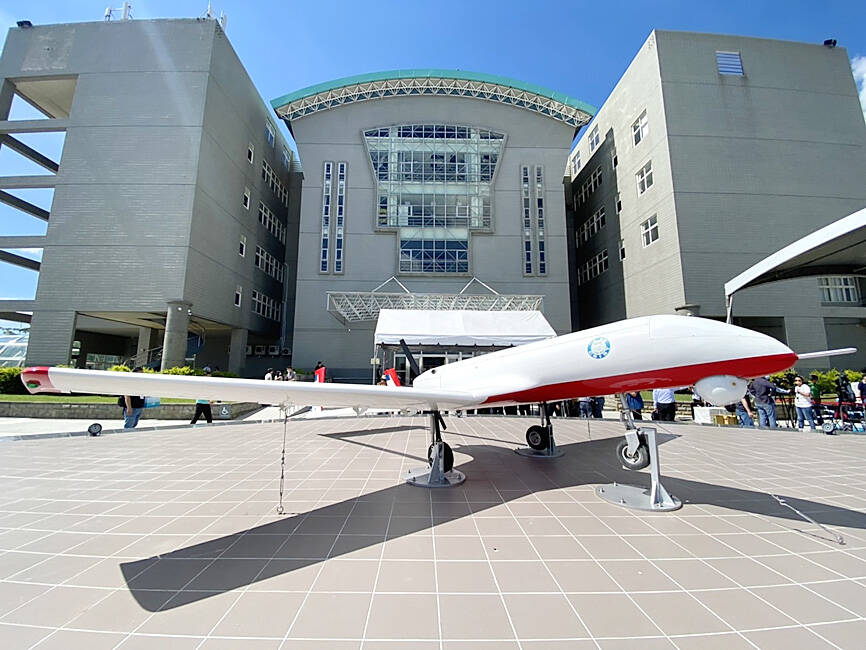Taiwan is to set up a large uncrewed aerial vehicle (UAV) testing facility in Chiayi County to help establish its drone supply chain with a greater share of the global market, Industrial Development Administration (IDA) Deputy Director-General Tsou Yu-hsin (鄒宇新) said.
The Ministry of Economic Affairs (MOEA) established an uncrewed aircraft system development program in the southern county at the end of last year with the aim of establishing a hub for drone-related businesses, Tsou said in a recent media interview.
As part of the program, an office, located in the Asia UAV AI Innovation Application R&D Center, assists companies working in the drone business, he said.

Photo: Tsai Tsung-hsun, Taipei Times
About 50 companies are based in the drone research and development center, and a nearby small testing facility allows products to be tested as soon as they are developed, Tsou said.
“Chiayi is ready to act as a hub for the drone industry as it has a good foundation for manufacturing,” he said.
“Now, we need a huge facility with larger runways for testing,” Tsou said. “So, we are planning to build a bigger testing venue to boost drone production.”
In addition to the large drone testing facility, an aerospace and drone industrial park big enough for about 100 companies is also being planned, he said. Construction is scheduled to be completed in 2028.
After the Russian invasion of Ukraine, more attention globally has been paid to how drones are used in military scenarios, he said.
China currently dominates the drone market, with Shenzhen-based DJI leading the way with about a 74 percent share of the global consumer drone market, Tsou said.
China’s dominant role has sparked concerns among many democratic countries and led to discussions about establishing a “non-red drone supply chain,” which could create a lot of opportunities for Taiwan, he said.
In September, the MOEA established the Taiwan Excellence Drone International Business Opportunities Alliance (TEDIBOA), led by Aerospace Industrial Development Corp.
The alliance currently has more than 120 members with a range of specialties, including drone system integration and critical component development.
“The move to form the TEDIBOA is the most efficient way to help Taiwanese drone developers seize on global business opportunities,” Tsou said. “The government is working to help the private sector forge business ties with potential foreign buyers through a G2G [government to government] channel.”
To provide further support to the local drone supply chain, the Ministry of National Defense recently sought suppliers of drones for military use, he said.
Four companies — Taiwan UAV, Evergreen Aviation Technologies Corp, MiTAC Information Technology Corp and Coretronic Intelligent Robotics Corp — were awarded the contract, he said.
They would supply the ministry with 3,422 drones over five years.
In addition, the MOEA has a budget of NT$110 million (US$3.36 million) to provide funding for drone AI imaging and low-cost flight control dashboard use.
The budget is pending approval from the Legislative Yuan and the MOEA’s Department of Industrial Technology.
According to the government, the production value of the local drone industry is expected to hit NT$5 billion this year and rise to NT$40 billion in 2030.

The Coast Guard Administration (CGA) yesterday said it had deployed patrol vessels to expel a China Coast Guard ship and a Chinese fishing boat near Pratas Island (Dongsha Island, 東沙群島) in the South China Sea. The China Coast Guard vessel was 28 nautical miles (52km) northeast of Pratas at 6:15am on Thursday, approaching the island’s restricted waters, which extend 24 nautical miles from its shoreline, the CGA’s Dongsha-Nansha Branch said in a statement. The Tainan, a 2,000-tonne cutter, was deployed by the CGA to shadow the Chinese ship, which left the area at 2:39pm on Friday, the statement said. At 6:31pm on Friday,

The Chinese People’s Liberation Army Navy’s (PLAN) third aircraft carrier, the Fujian, would pose a steep challenge to Taiwan’s ability to defend itself against a full-scale invasion, a defense expert said yesterday. Institute of National Defense and Security Research analyst Chieh Chung (揭仲) made the comment hours after the PLAN confirmed the carrier recently passed through the Taiwan Strait to conduct “scientific research tests and training missions” in the South China Sea. China has two carriers in operation — the Liaoning and the Shandong — with the Fujian undergoing sea trials. Although the PLAN needs time to train the Fujian’s air wing and

The American Institute in Taiwan (AIT) put Taiwan in danger, Ma Ying-jeou Foundation director Hsiao Hsu-tsen (蕭旭岑) said yesterday, hours after the de facto US embassy said that Beijing had misinterpreted World War II-era documents to isolate Taiwan. The AIT’s comments harmed the Republic of China’s (ROC) national interests and contradicted a part of the “six assurances” stipulating that the US would not change its official position on Taiwan’s sovereignty, Hsiao said. The “six assurances,” which were given by then-US president Ronald Reagan to Taiwan in 1982, say that Washington would not set a date for ending arm sales to Taiwan, consult

A Taiwanese academic yesterday said that Chinese Ambassador to Denmark Wang Xuefeng (王雪峰) disrespected Denmark and Japan when he earlier this year allegedly asked Japan’s embassy to make Taiwan’s representatives leave an event in Copenhagen. The Danish-language Berlingske on Sunday reported the incident in an article with the headline “The emperor’s birthday ended in drama in Copenhagen: More conflict may be on the way between Denmark and China.” It said that on Feb. 26, the Japanese embassy in Denmark held an event for Japanese Emperor Naruhito’s birthday, with about 200 guests in attendance, including representatives from Taiwan. After addressing the Japanese hosts, Wang